2024 SEO Recap for Small Businesses: Top AI-Driven Strategies You Can Use
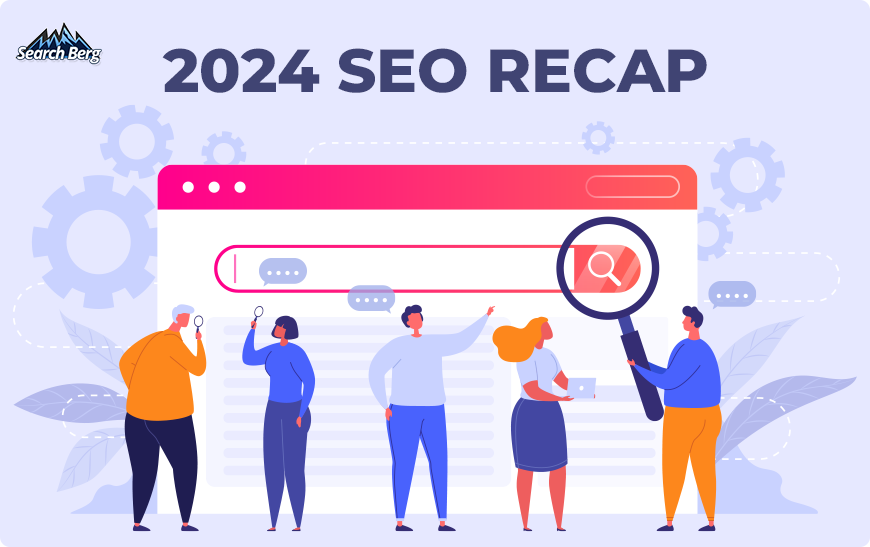
If 2024 taught us anything in the SEO world, it’s that AI is no longer a futuristic concept; it’s a present-day reality. This year, we saw AI influence search in unprecedented ways, from how content is ranked to how users discover information.
For many, this shift felt like a sudden earthquake, shaking up long-held strategies and demanding a new approach to optimization. However, those who embraced artificial intelligence in SEO discovered a new level of precision and efficiency.
In this recap, we’ll analyze the seismic shifts of 2024 and use those insights to build a stronger foundation for 2025. We’ll explore the core updates that reshaped SERPs, the rise of AI search algorithms, and the strategies that proved most effective in the face of change.
We’ll also help you understand the importance of professional SEO services in the competitive SEO jungle of 2025.
Let’s get grounded, analyze the aftershocks, and prepare for a future where AI and SEO work hand-in-hand.
The Core Updates of 2024
Google’s AI-powered search algorithm analyzing website content and user reviews to improve search results.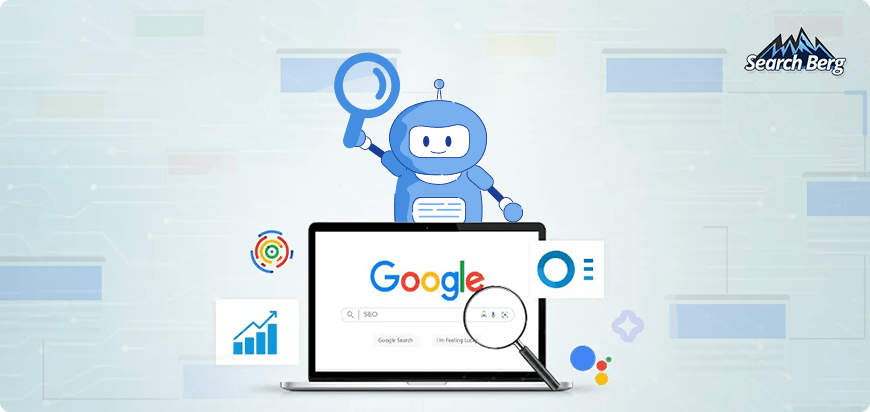
While 2024 may not have reached “hold onto your hats” levels of volatility in terms of Google algorithm updates, it certainly kept SEO professionals on their toes. Google continued its mission to deliver the most relevant and helpful search results, refining its core ranking algorithms through a series of updates throughout the year.
Here’s a recap of the significant updates that shaped the search landscape in 2024:
- March 2024 Core Update: This update, which Google themselves described as the “largest core update in history,” rolled out on March 5th and took a lengthy 45 days to fully complete. Google confirmed that this update involved changes to multiple core systems, making it more complex than their typical core updates.
- August 2024 Core Update: Launched on August 15th, this update focused on promoting high-quality content while demoting low-value or SEO-driven content. It also brought changes to how Google’s AI overviews were presented in search results.
- November 2024 Core Update: This update, starting on November 11th, aimed to improve the overall quality of search results by prioritizing genuinely useful content. While it caused some ranking fluctuations, it was generally perceived as less volatile than the March and August updates.
- December 2024 Core Update: Hot on the heels of the November update, Google rolled out another core update on December 12th. This update was completed relatively quickly and seemed to focus on refining the search experience, particularly around site reputation and abuse.
These core updates, along with various smaller updates and adjustments throughout the year, underscored Google’s ongoing commitment to refining its search algorithms and delivering the most relevant and helpful results to users.
So, what does this mean for your SEO strategy?
In a nutshell, it means that the days of gaming the system with keyword stuffing and shady link building techniques are over. The future of SEO belongs to those who prioritize user experience, create valuable content, build genuine authority in their niche, and, of course, master the artificial intelligence ropes.
In this blog, our focus is on the latter.
The Focus on AI
While AI has been simmering beneath the surface of search algorithms for some time this year, it boiled over, transforming the very essence of how we find and consume information online.
This AI-driven evolution in search has profound implications for SEO professionals and businesses alike. We must now embrace a deeper understanding of how AI is shaping user behavior, content creation, and the search experience itself.
Think of it this way. In the past, SEO often relied on optimizing for specific keywords and technical elements to improve rankings. But with AI at the helm, search has become more sophisticated.
In 2025, businesses can’t just target keywords and call it a day. Instead, they must focus on crafting content that provides genuine value, answers questions effectively, and offers a seamless user experience.
This means understanding the nuances of language, context, and user behavior to create content that resonates with both human visitors and intelligent algorithms.
In essence, AI is pushing SEO towards a more holistic and user-centric approach, where the focus is on providing genuine value and meeting the needs of real people.
Let’s review the top trends in AI-driven search in 2024 to understand how these advancements are reshaping the search arena and what you can do to leverage them for greater online success.
A Roundup of the Top Trends in AI-Driven Search in 2024
1. The Rise of Semantic Search
Google, with its ever-evolving AI search algorithms, is becoming increasingly adept at understanding the meaning and intent behind search queries. This means that simply stuffing your content with keywords is no longer enough; you need to create semantically rich content using natural language and related concepts to demonstrate a deep understanding of the topic.
Previously, if someone searched for “how to bake a cake,” Google would primarily look for pages that contained those exact keywords. But with semantic search, Google now considers the context and relationships between words. It understands that “bake a cake” is related to concepts like “ingredients,” “oven,” “recipe,” “frosting,” and so on.
This means that your content must do more than simply contain keywords like “bake a cake.” It needs to incorporate related terms and concepts, demonstrating a comprehensive understanding of the topic. This not only helps Google understand your content better but also provides a more valuable and informative experience for your users.
Here are a few tips for optimizing your content for semantic search:
- Use Natural Language: Write in a way that is clear, concise, and easy to understand. Avoid keyword stuffing and unnatural language.
- Incorporate Related Keywords: Use a variety of related keywords and phrases throughout your content.
- Structure Your Content Logically: Use headings, subheadings, and bullet points to organize your content and make it easier to read.
- Use Schema Markup: Schema markup helps search engines understand the context of your content, making it easier for them to deliver relevant results.
While semantic search has been an ongoing evolution in how search engines understand and interpret queries, 2024 saw a particularly marked acceleration in this evolution, primarily due to the integration of advanced AI techniques.
Here’s how artificial intelligence is driving the progress of semantic search:
- Natural Language Processing (NLP): AI-powered NLP allows search engines to understand the nuances of human language, including context, synonyms, and even sentiment. This enables them to interpret the true meaning of a query, even if it’s expressed in a conversational or complex way.
- Knowledge Graphs: AI helps build and maintain massive knowledge graphs, which are essentially databases of entities and their relationships. These knowledge graphs allow search engines to understand the connections between concepts and deliver more relevant results.
- Machine Learning (ML): ML algorithms enable search engines to learn from vast amounts of data, constantly refining their understanding of language and user behavior. This allows them to adapt to new search patterns and deliver increasingly accurate results.
Why is this relevant to 2024 specifically?
While these AI technologies have been in development for years, 2024 saw significant breakthroughs in their application to search. Google, in particular, made significant strides in integrating these AI capabilities into its core algorithms. This resulted in a noticeable improvement in the accuracy and relevance of search results.
For example, Google’s introduction of the Multitask Unified Model (MUM) in 2021 and its continued refinement in 2024 significantly enhanced its ability to understand complex queries and provide more comprehensive answers. MUM can synthesize information from multiple sources, including text, images, and videos, to provide a more holistic understanding of a topic.
In essence, while semantic search has been an ongoing evolution, 2024 marked a turning point where AI-powered advancements significantly enhanced its capabilities, resulting in a more intelligent and intuitive search experience.
2. Hyper-Personalization
AI-driven search is ushering in an era of hyper-personalization, where search engines leverage artificial intelligence in SEO to deliver increasingly personalized results. This means that search results are no longer one-size-fits-all; they are tailored to individual user preferences, search history, location, and even the device they’re using.
This trend has significant implications for SEO. In the past, you may have optimized your content for a broad audience. But with hyper-personalization, you need to consider the specific needs and interests of different user segments.
Here are a few examples of how AI is being used to personalize search results:
- Location-Based Personalization: Google can tailor search results based on the user’s location. For example, if you search for “restaurants near me,” Google will prioritize restaurants that are actually near you. This is particularly useful for businesses with a local customer base, as it increases their visibility to potential customers in their immediate vicinity.
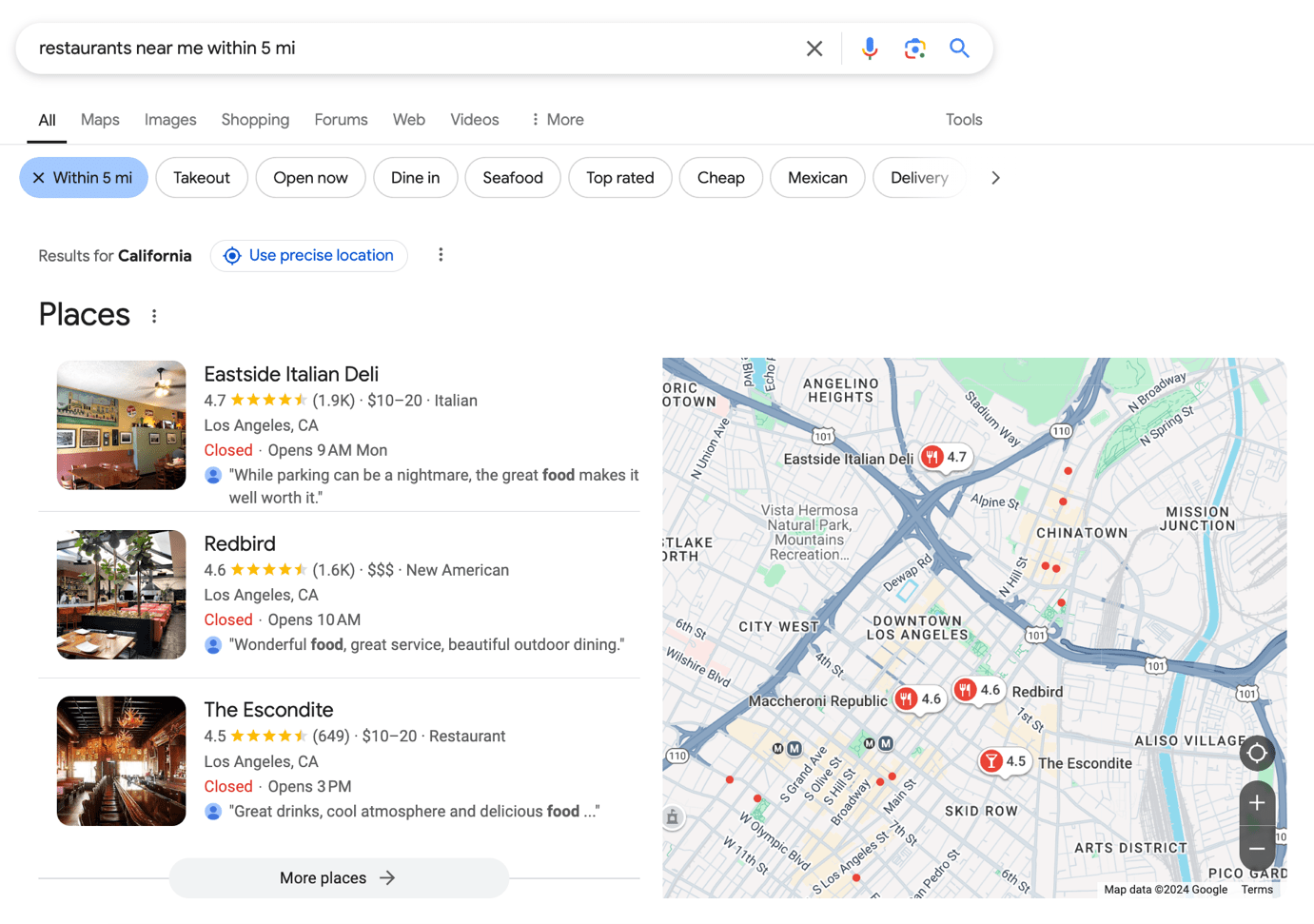
AI is also being used to refine location-based search by considering factors like the user’s past location history, the time of day, and even the user’s current activity (e.g. if they are walking, driving, or using public transport).
- Search History Personalization: Google can personalize results based on your past search history. For example, if you frequently search for recipes, Google may show you more recipe-related results in the future, even if your current query isn’t directly related to cooking. This reflects Google’s understanding that your past behavior can provide valuable insights into your current needs and interests.
This type of personalization can be incredibly powerful for businesses, as it allows them to target users who have previously shown an interest in their products or services.
- Interest-Based Personalization: Google can personalize results based on your interests, as determined by your browsing history, the websites you follow, and the content you interact with online.
For example, if you frequently visit websites about travel, Google may show you more travel-related results, even if your current query is about something completely different.
This type of personalization allows Google to provide users with a more relevant and engaging search experience, but it also presents challenges for businesses, as they need to ensure their content aligns with the interests of their target audience.
- Device-Based Personalization: Google can also personalize search results based on the device you’re using. For example, if you’re searching on a mobile device, Google may prioritize mobile-friendly websites and apps. This is because Google understands that users on different devices have different needs and expectations.
For businesses, this means that optimizing for mobile is no longer just a best practice; it’s essential for reaching a growing segment of users who rely on their smartphones for search.
- Social Media Personalization: Google can even personalize search results based on your social media activity. For example, if you’ve liked a particular brand on Facebook, Google may show you more results from that brand in your search results.
This highlights the growing convergence of search and social media and the importance of maintaining a strong social media presence to enhance your online visibility.
What does this mean for your business?
As AI gets even smarter, you can expect search results to become increasingly tailored to each individual user. This means it’s more important than ever to understand these personalization trends and adapt your SEO strategy accordingly. By doing so, you can ensure your content is seen by the right people at the right time, increasing your chances of engagement, clicks, and conversions.
In 2025, staying ahead of the curve will require a deep understanding of how AI is shaping user expectations and delivering personalized experiences.
3. Predictive Analytics in SEO
Predictive analytics is another game-changing trend in AI-driven search. By analyzing vast amounts of data, AI can identify emerging keywords and topics, allowing you to proactively optimize your content and stay ahead of the curve.
Think of it as having a crystal ball for SEO. Instead of reacting to trends after they’ve already happened, you can anticipate them and position yourself to capitalize on them before your competitors even catch on.
Here are a few ways AI is being used for predictive analytics in SEO:
- Keyword Trend Forecasting: AI can analyze search data, social media trends, and news articles to identify keywords and topics that are likely to become popular in the future. This allows you to create content that is relevant to emerging search trends. You get a much-needed head start in the rankings.
- Content Performance Prediction: AI can analyze your existing content and predict its future performance based on factors like keyword relevance, content quality, and user engagement. This can help you identify content that needs to be updated or optimized to improve its visibility and performance.
- Competitor Analysis: AI can analyze your competitors’ content and SEO strategies, identifying their strengths and weaknesses. This allows you to learn from their successes and capitalize on their shortcomings.
- Personalized Content Recommendations: AI can analyze user data to predict what type of content individual users are most likely to engage with. This allows you to deliver personalized content recommendations, improving user experience and increasing conversions.
Let’s understand things better with an example.
Say you’re a travel blogger. AI may predict that “sustainable travel” will be a trending topic in the coming months. You can then proactively create content about sustainable travel destinations, eco-friendly travel tips, and responsible tourism practices. This will position you as an authority on the topic and attract a growing audience interested in sustainable travel.
Predictive analytics is a powerful tool that can give you a significant advantage in the competitive world of SEO. By leveraging AI to anticipate future search trends, you can create content that is not only relevant and engaging but also strategically positioned for long-term success.
5. The Evolution of Voice Search
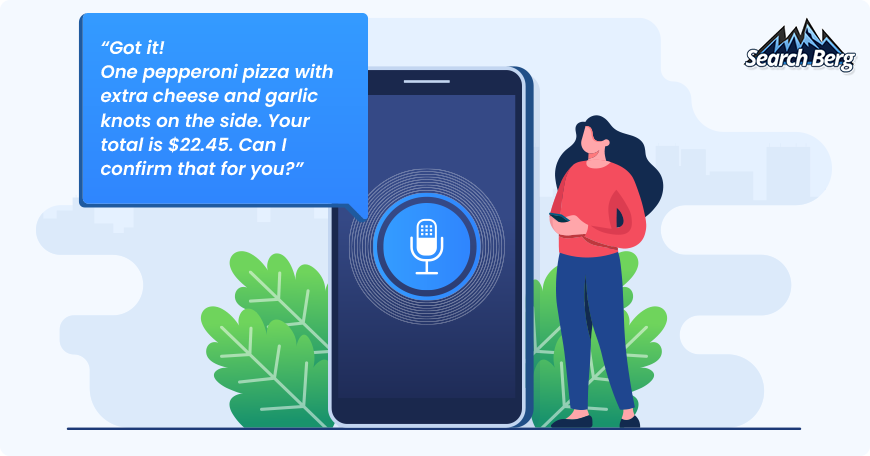
Voice search isn’t exactly a new kid on the block, but in 2024, it graduated from a novelty to a mainstream way of interacting with the digital world. And as more people embraced the convenience of asking their devices for information, AI-driven search stepped up to make those conversations more intuitive and insightful than ever before.
When you use voice search, you’re not typing keywords into a search bar; you’re speaking naturally, using full sentences and conversational phrases. This presents a unique challenge for search engines, as they need to decipher the intent behind these spoken queries and deliver relevant results.
This is where AI comes in. Advanced Natural Language Processing (NLP) algorithms allow search engines to understand the nuances of human speech, including slang, accents, and even incomplete sentences. They can also identify the context of a query, taking into account the user’s location, past search history, and even the current conversation.
Here’s how AI is shaping the evolution of voice search:
- Understanding Complex Queries: AI can decipher the meaning of complex, multi-part questions, even if they’re phrased in a conversational way.
- Identifying User Intent: AI can determine the user’s underlying goal, even if it’s not explicitly stated in the query.
- Providing Personalized Results: AI can tailor search results based on the user’s individual preferences and needs.
- Delivering Conversational Responses: AI is enabling voice assistants to respond in a more natural and conversational way, making the interaction feel more human-like.
What does this mean for SEO in 2025?
As voice search continues to evolve, you must optimize your content for these conversational queries.
This means:
- Focusing on Long-Tail Keywords: People tend to use longer, more conversational phrases when using voice search.
- Using Natural Language: Write in a way that is clear, concise, and easy to understand.
- Answering Questions Directly: Structure your content to provide direct answers to common questions.
- Optimizing for Local Search: Many voice searches are location-based, so make sure your website is optimized for local SEO.
Remember, when it comes to voice search, relevance is paramount. As AI empowers search engines to better understand the nuances of spoken language and user intent, your content must be crafted to answer questions directly, provide concise and informative responses, and offer a seamless conversational experience.
By anticipating the needs of voice search users and optimizing your content accordingly, you can ensure your business remains discoverable and engaging in this increasingly conversational digital space.
6. AI-Driven Local SEO
In 2024, AI-driven search didn’t just revolutionize how we find information on a global scale; it also transformed the way we discover businesses and services in our local communities.
AI-driven local SEO has become more sophisticated than ever, with search engines leveraging artificial intelligence to better understand user location, intent, and preferences, resulting in more accurate and personalized local search results.
This means that for local businesses, simply claiming your Google Business Profile and throwing a few keywords on your website is no longer enough. To truly thrive in the local search jungle, you need to understand how AI is influencing local search and adapt your strategies accordingly.
Here’s how AI is shaping local SEO:
- Hyperlocal Search: AI is enabling search engines to understand user location with unprecedented accuracy, taking into account not just the city and state but also the specific neighborhood, street, or even building the user is searching from. This means that businesses need to ensure their online presence is optimized for hyperlocal searches, including relevant keywords and location-specific information.
- Understanding Local Intent: AI is helping search engines decipher the intent behind local searches, differentiating between users who are looking for information, those who are ready to make a purchase, and those who are looking for a specific type of service. This means that businesses need to tailor their content and online presence to match the specific needs and expectations of local searchers.
- Personalized Local Recommendations: AI is powering personalized local recommendations, taking into account the user’s past search history, preferences, and even their social connections. This means that businesses need to focus on building a strong online reputation and encouraging positive reviews to increase their chances of being recommended to relevant users.
- AI-Powered Local Business Listings: AI is being used to enhance local business listings, providing users with more detailed and relevant information about businesses in their area. This includes features like AI-generated descriptions, image recognition, and even virtual tours, making it easier for users to discover and engage with local businesses.
To succeed in the age of AI-driven local SEO, businesses need to follow this 5-step process:
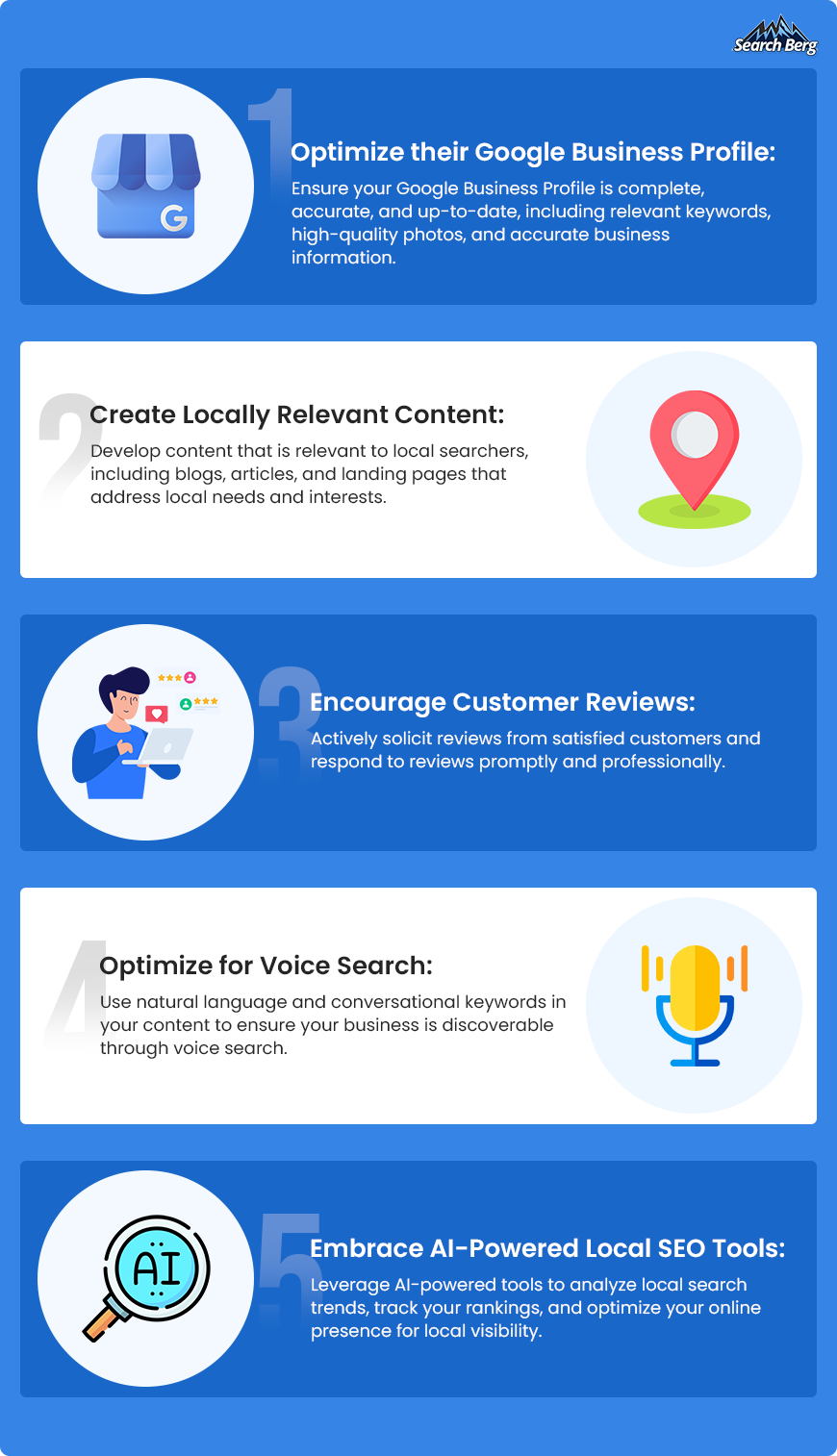
AI will continue to play an increasingly important role in local SEO, enabling even more sophisticated and personalized local search experiences. This means that staying ahead of the curve will require a deep understanding of how AI is shaping local search trends and user behavior.
By embracing AI-powered local SEO tools and strategies, you can ensure your business remains visible and accessible to the growing number of users who rely on search engines to discover local businesses and services.
7. EEAT and AI
Google’s emphasis on Expertise, Experience, Authoritativeness, and Trustworthiness (EEAT) has become a guiding principle for content creators and website owners alike. In 2024, as AI-driven search gained momentum, EEAT took on even greater significance.
AI is no longer just a tool for analyzing keywords and optimizing content; it’s also being used to assess the credibility of information and identify authoritative sources.
This means that businesses must ensure their content demonstrates a high level of EEAT. In other words, your content needs to be backed by real expertise, based on genuine experience, presented by an authoritative source, and delivered in a trustworthy manner.
But how exactly is AI influencing EEAT?
Let’s break it down:
- AI as an EEAT Detective: AI algorithms are becoming increasingly sophisticated at analyzing various factors to determine the EEAT of a website or content creator.
These factors include:
- Website Reputation: AI can assess the overall reputation of a website based on factors like domain age, backlink profile, and user engagement metrics.
- Author Credentials: AI can analyze author bios, publications, and online presence to determine their level of expertise and authority in a particular field.
- Content Quality: AI can evaluate the accuracy, completeness, and originality of content, identifying potential red flags like plagiarism or misinformation.
- User Reviews and Feedback: AI can analyze user reviews, comments, and social media mentions to gauge the overall trustworthiness of a website or brand.
- AI-Powered Fact-Checking: AI is being used to combat the spread of misinformation and fake news online. By cross-referencing information from multiple sources and analyzing language patterns, AI can help identify and flag potentially inaccurate or misleading content.
This means that businesses need to be extra vigilant about the accuracy and credibility of their content.
- The Rise of Authoritative AI: As AI becomes more prevalent in content creation, it’s important to remember that the AI terrain is in no way even. Google is likely to prioritize content generated by authoritative AI sources, e.g., well-established research institutions or recognized experts in their field. This means that businesses need to be mindful of the source of their AI-generated content and ensure it aligns with their overall EEAT goals.
What does this mean for your SEO strategy in 2025?
In the age of AI-driven search, EEAT is no longer just a nice-to-have; it’s a must-have.
To ensure your content ranks well and resonates with your audience, you need to:
- Prioritize Quality Over Quantity: Focus on creating high-quality, well-researched content that provides genuine value to your audience.
- Showcase Your Expertise: Highlight your credentials, qualifications, and experience in your field.
- Build a Strong Online Reputation: Cultivate positive reviews, testimonials, and mentions from other authoritative sources.
- Maintain a Secure and Trustworthy Website: Use HTTPS, display clear contact information, and publish a comprehensive privacy policy.
- Embrace AI-Powered EEAT Tools: Leverage AI tools to analyze your website’s EEAT signals, identify areas for improvement, and track your progress.
AI will continue to play an increasingly important role in assessing EEAT, making it even more important for businesses to prioritize trust and credibility in their online presence.
By embracing AI-powered tools and strategies, you can ensure your website remains a trusted source of information in the eyes of both users and search engines.
Charting Your Course for Success
As we wrap up this recap, it’s clear that we’re at a pivotal moment in the evolution of SEO. Artificial intelligence in SEO is no longer a futuristic concept; it’s a present-day reality that’s transforming how we create content and connect with our audience.
But navigating this new era of AI-driven search can be challenging. The complex trends we’ve discussed demand a deep understanding of how AI is shaping user behavior and search engine algorithms.
That’s where Search Berg’s search engine optimization services come in.
At Search Berg, we’re passionate about helping businesses like yours thrive in the age of AI. We’ll work with you to create a customized strategy that leverages the power of AI to improve your rankings, increase your visibility, and drive more organic traffic to your website.
Ready to take your SEO to the next level with the power of AI?
Sign up for Search Berg’s professional SEO services today.
Don't Get Left Behind in 2025
Learn from 2024 and sharpen your SEO tools accordingly. At Search Berg, we’re ready to show you the way. Let’s start with a free consultation.
No spam, just expert advice!












